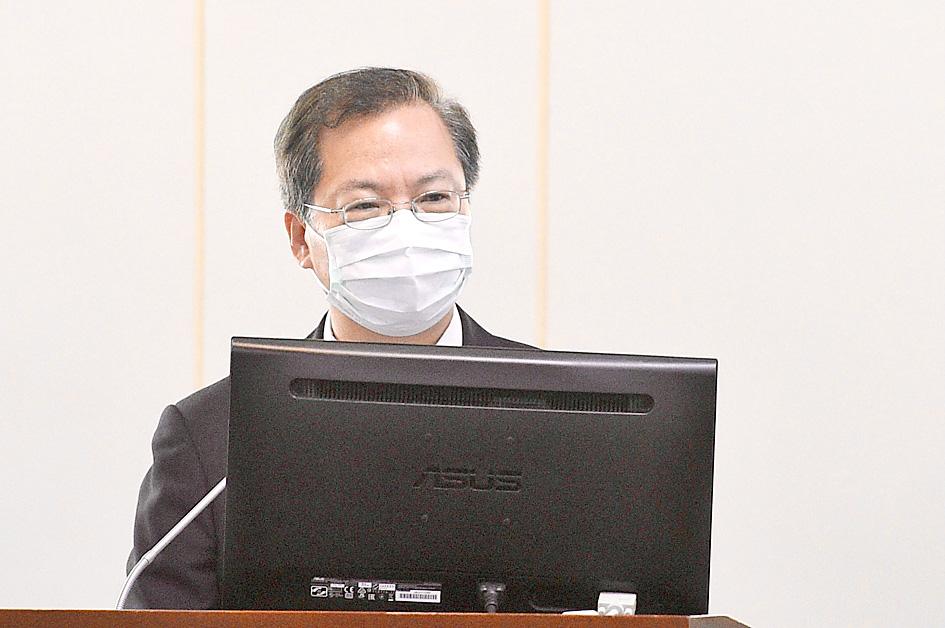Highly skilled blue-collar workers are being excluded from government attempts to attract foreign talent, lawmakers yesterday told a joint meeting of the legislature’s Economics Committee, Social Welfare and Environmental Hygiene Committee, and Education and Culture Committee.
Draft amendments to the Act for the Recruitment and Employment of Foreign Professionals (外國專業人才延攬及雇用法修正草案) seek to ease requirements for foreign white-collar employees who want to work in Taiwan, but in-demand blue-collar workers face much more onerous rules, Taiwan People’s Party Legislator Ann Kao (高虹安) said.
“There are many migrant workers who come to Taiwan to work in our tech factories on the production lines under the Employment Service Act (就業服務法),” Kao said. “They are highly skilled workers, yet they are limited to 12 to 14 years here before they have to leave Taiwan.”

Photo: George Tsorng, Taipei Times
By limiting the employment period of foreign blue-collar workers, Taiwan risks becoming a “training center,” leaving those workers, who could have otherwise made Taiwan their home, with no choice but to move to another country, Kao said.
“With the rising importance of technology in US-Taiwan-China relations, this is a national security issue,” she said.
National Development Council Minister Kung Ming-hsin (龔明鑫) said he agreed that blue-collar talent drain is “of grave concern to Taiwanese industry.”
“It is not an issue that is addressed in the draft amendments,” Kung said. “However, we are in talks with Vice Premier Shen Jong-chin (沈榮津) to deal with the problem separately.”
The talks are still in preliminary stages, he added.
Unlike blue-collar workers, “foreign special professionals” can stay in Taiwan indefinitely and have a pathway to permanent resident status, the council has said.
Foreign special professionals are described as employees who possess special expertise needed by Taiwan in science and technology, economics, education, culture, the arts, sports or other fields as determined by the authorities.
The draft includes extending short-term tax breaks offered to foreign special professionals to attract more talent, Kung said.
“We have a relatively high top marginal income tax of 40 percent versus 22 percent in Singapore and 17 percent in Hong Kong. I hope that by giving highly skilled foreign talent an extra incentive to try living in Taiwan, they will like [Taiwan] so much that they will stay,” he said.
The draft amendments seek to extend the tax break period from three to five years, the council has said.
If a foreign professional’s annual income reaches NT$3 million (US$107,852) during the five-year period, only half of the amount over that threshold would be included in gross income in the assessment of income tax liability, according to the draft amendments.
Simply cutting the tax is not being considered, because that would affect the government’s financial structure, Kung said.
However, he is upbeat that even a short-term benefit could result in foreign professionals choosing to make Taiwan their home, he said.
“People who try living in Taiwan end up loving it here,” Kung said. “We want to encourage more highly skilled professionals around the world to give Taiwan a chance.”

Intel Corp chief executive officer Lip-Bu Tan (陳立武) is expected to meet with Taiwanese suppliers next month in conjunction with the opening of the Computex Taipei trade show, supply chain sources said on Monday. The visit, the first for Tan to Taiwan since assuming his new post last month, would be aimed at enhancing Intel’s ties with suppliers in Taiwan as he attempts to help turn around the struggling US chipmaker, the sources said. Tan is to hold a banquet to celebrate Intel’s 40-year presence in Taiwan before Computex opens on May 20 and invite dozens of Taiwanese suppliers to exchange views

Application-specific integrated circuit designer Faraday Technology Corp (智原) yesterday said that although revenue this quarter would decline 30 percent from last quarter, it retained its full-year forecast of revenue growth of 100 percent. The company attributed the quarterly drop to a slowdown in customers’ production of chips using Faraday’s advanced packaging technology. The company is still confident about its revenue growth this year, given its strong “design-win” — or the projects it won to help customers design their chips, Faraday president Steve Wang (王國雍) told an online earnings conference. “The design-win this year is better than we expected. We believe we will win

Chizuko Kimura has become the first female sushi chef in the world to win a Michelin star, fulfilling a promise she made to her dying husband to continue his legacy. The 54-year-old Japanese chef regained the Michelin star her late husband, Shunei Kimura, won three years ago for their Sushi Shunei restaurant in Paris. For Shunei Kimura, the star was a dream come true. However, the joy was short-lived. He died from cancer just three months later in June 2022. He was 65. The following year, the restaurant in the heart of Montmartre lost its star rating. Chizuko Kimura insisted that the new star is still down

While China’s leaders use their economic and political might to fight US President Donald Trump’s trade war “to the end,” its army of social media soldiers are embarking on a more humorous campaign online. Trump’s tariff blitz has seen Washington and Beijing impose eye-watering duties on imports from the other, fanning a standoff between the economic superpowers that has sparked global recession fears and sent markets into a tailspin. Trump says his policy is a response to years of being “ripped off” by other countries and aims to bring manufacturing to the US, forcing companies to employ US workers. However, China’s online warriors